Auckland’s young bands and gig-going population flooded the city’s available venues in the second half of 1980. XS Café, Rumba Bar, New Station Hotel, Kicks, The Gluepot, Windsor Castle, DB Esplanade, Reggae Club, Reverb Room (formerly Liberty Stage) and Mainstreet, when it reopened in November, all fizzed with the new energy.
Andrew Snoid (McLennan), a long time scene participant who took over as the new singer in Pop Mechanix in 1980 after Richard Driver’s departure was in as good a position as any to survey the new tumult. The group headlined at least 34 times on Auckland stages from July through December.
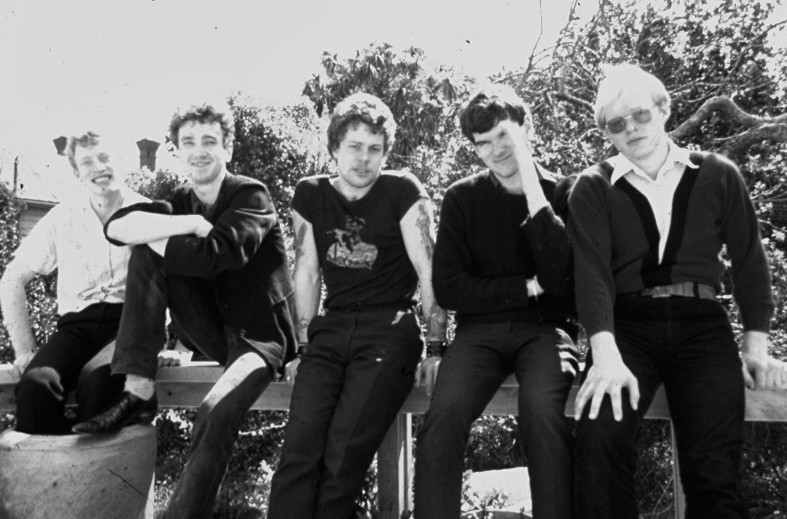
Pop Mechanix - Photo by Bryan Staff. Simon Grigg collection
In early 2006, McLennan summed the breadth and depth of the Auckland live scene in those years. “There were 11 headlining acts playing in rooms in Auckland. And almost all of those bands had a support act. I tried to work out how many people were out paying to see bands and I reckon it would have been around 10,000. It was very buoyant. People were going to shows and to the bars and clubs and paying the door charge.”
In support, Pop Mechanix often had one or another of the city’s rising bands, including The Newmatics and Shoes This High, who brought the Wellington post-punk sound north in July. In turn, McLennan’s new group supported Manchester’s Magazine at Mainstreet in late August and early September and American hit makers The Motels at Logan Campbell Centre in November.
Till I Die
July added three other names to the growing list of overseas visitors to the Queen City. The B52s were at Logan Campbell Centre on the 12th. The Ramones with The Whizz Kids in support followed there on the 21st. The Cure played four shows over two nights at Mainstreet on the 29th and 30th. All three charted here.
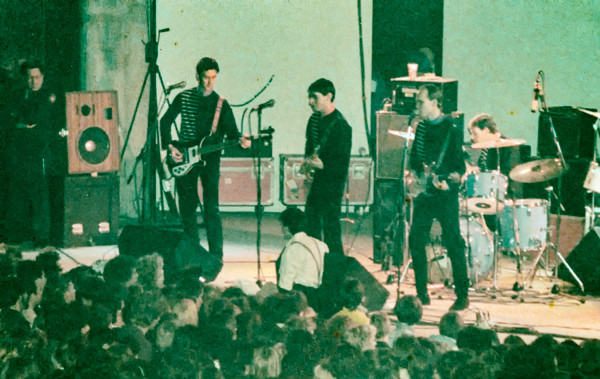
Techtones supporting The B52s at The Logan Campbell Centre. - Steve Roach collection
The Swingers bowed out with a final XS Café show early in the month, kicking off a string of dates at the venue by the likes of The Spelling Mistakes, Pop Mechanix, The Screaming Meemees and Shoes This High, who paired up with The Features for the Anti-Violence Dance there at month’s end.
The Committee was in session at XS Café in July with rumours circulating of a track called ‘Luxury 3’ recorded in Harlequin Studios at 112 Albert Street. The only song The Committee would ever release was ‘Jets’, recorded by Doug Rogers and Simon Alexander at Harlequin: but that wasn’t made available until 1987 on the Walking Monk Tape, A Bit Of A Strange Tape.
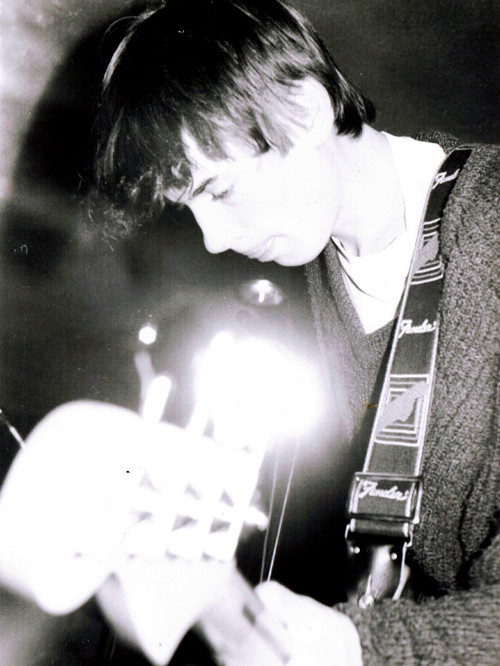
The Screaming Meemees' Peter van der Fluit - Photo by Luke Nola
The exact date is unknown, but some time in the middle of 1980, The Screaming Meemees recorded their first batch of original songs with manager Dave Merritt and Steve Kennedy at Harlequin Studios. The insanely catchy ‘All Dressed Up’, ‘My Girl’s Got Pointy Ears’, ‘Till I Die’ and an early version of ‘See Me Go’ would all eventually see the light of day on compilations and singles before The Screaming Meemees split in 1983.
You might have already noticed already that Harlequin Studios was a hive of activity that year. The Dum Dum Boys captured the Let There Be Noise album there in July for release on their Bondage Records, although the LP wasn’t pressed until mid-1981.
In late July, The Features announced they would record an album at Harlequin and then they’d disband. The posthumous Perfect Features Exposed EP was the result of those recordings. Jed Town headed to Sydney before moving to Melbourne with Sara Fort, at Ronnie Recent’s insistence, for a collaboration that didn’t work out.
One more song of note was taped at the busy Harlequin that month, although you’d be hard pressed to categorise it. The Top Scientists (John Molloy, Gary Langsford, Alastair Dougal and Michael Polglase) were a full on R&B group who got the music down for the decidedly punk-ish ‘Third World War’. R&B belter Rick Bryant put his furious vocal to it, sounding like a young Joe Strummer fresh out of The 101ers.
‘Third World War’ appeared in early 1981 on the mostly lacklustre Hauraki Homegrown ’80 compilation of Auckland groups (which did, however, feature a strong early take on The Screaming Meemees’ ‘See Me Go’).
If you wanted to see what many of the city’s active band’s members looked like, but couldn’t make the gigs, the Pop Shot Show at Ray Castle’s Closet Artists Gallery, 520 Queen Street, had photographs of them on the wall from July into August. All nicely summed up in a popular Philip Peacocke poster that showed members of The Respectables, The Swingers, Pop Mechanix, Techtones, Whizz Kids, Toy Love, The Spelling Mistakes and The Terrorways, amongst others.
The Spelling Mistakes headlined Kicks from 31 July through 2 August. Techtones punched the venue’s clock as well. Toy Love was back in Auckland in early August for a final tour that started with a string of Queen City shows at Windsor Castle, The Esplanade in Takapuna, Mainstreet and The Gluepot. Warming up the crowds were Shoes This High, The Spelling Mistakes and The Features.
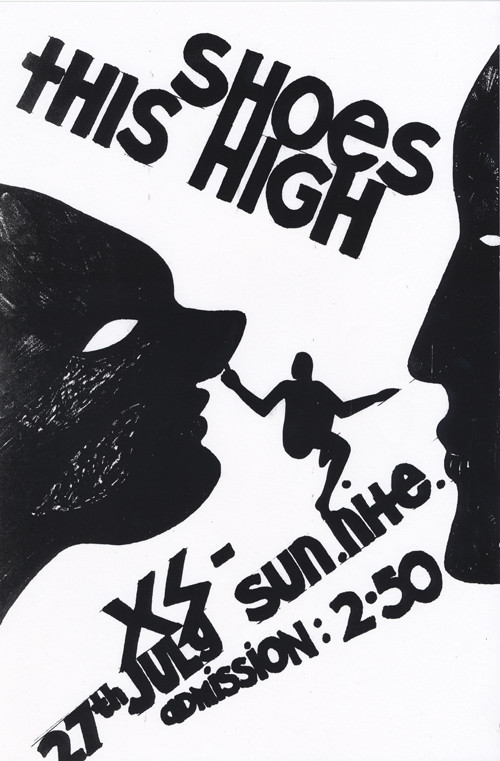
Shoes This High at XS Café, July 1980.
XS Café had nearly those groups on its live list. Shoes This High paired up with The Features and The Newmatics on different weekends, while The Screaming Meemees and The Respectables played four nights at month’s end.
In the suburban wilds of the North Shore at Glenfield Community Hall, The Gordon Bennetts and The Flicks chopped out their hard punk and post-punk sounds.
New on the scene with two late August dates at The Gluepot were Penknife Glides, who in their early days were a stylish mod group, echoing the re-emergence of the cult in the wake of the release of Quadrophenia, the Franc Roddam film of the Who rock opera about mods and rockers. The evocative film brimmed with a clear-eyed and realistic take on youth culture – unlike the American movies of the time – and screened in Auckland on 20 June at the St James Theatre.
The second arrival of mod is one of New Zealand’s lost music cults. The sub-cultural tides turned so quickly in the early 1980s that groups who were overtly identified with one sound or another were soon disavowing former allegiances and often claiming they weren’t that at all.
Christchurch’s Pop Mechanix were close to resident in Auckland; they and a good chunk of the rising North Shore scene, including The Ainsworths, The Moderns, The Killjoys and The Screaming Meemees, were identified musically and stylistically with the new breed. The Spelling Mistakes had a tongue-in-cheek song called ‘I Wanna Be a Mod’.
It was a cultural display that wasn’t without some consequence. “It didn’t take long for us to work out [that] dressing like a mod in the city was very dangerous for your health,” The Screaming Meemees’ Michael O’Neill told Trevor Reekie in mid-2005. “The live scene was very aggressive. The punk explosion of the late 1970s left the city a bit of a battleground for anyone trying to express themselves. If you looked different you were a target and the amount of trouble you were in depended on who was doing the looking. We were young, bored and from the North Shore. A recipe for disaster in 1980.”
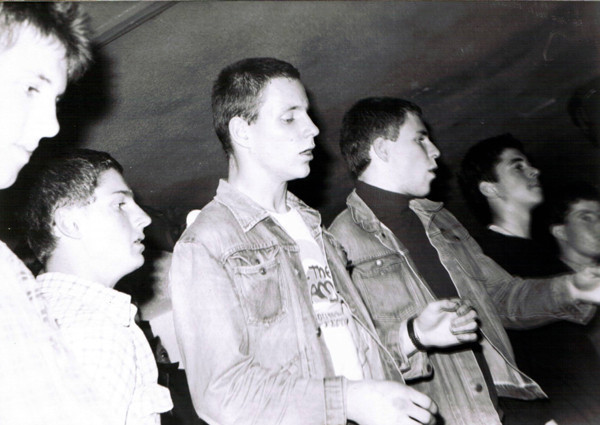
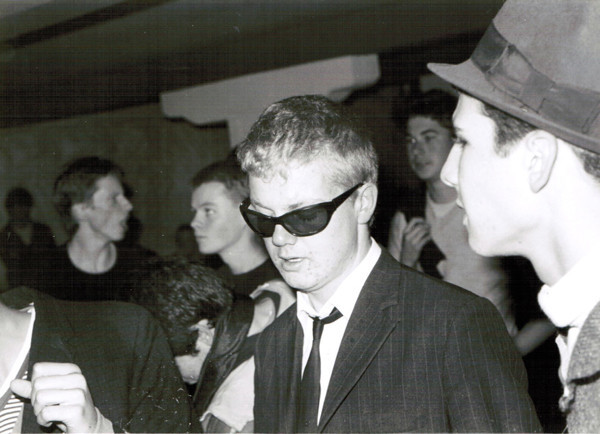
Mods, 1980 - Photos by Luke Nola
A quick scan of the New Zealand album and singles charts and non-charting releases reveals the exceptional local success of The Jam, the English group most associated with the UK mod revival. Their fourth album, Setting Sons, made the Top 20 here in March and the aggressive, anthemic ‘Going Underground’ single hit the Top 30 in May 1980. A string of New Zealand chart singles and albums followed.
There was a local connection as well. New Zealand expatriate Chris Parry – who produced the first two albums and part of the third Jam LP – had The Purple Hearts on his Fiction Records label. The Parry-produced Beat That! and ‘Jimmy’ single were released in New Zealand.
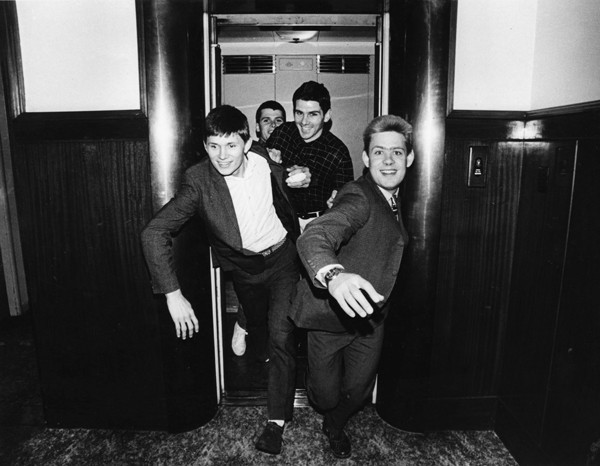
Penknife Glides - Cliff Gravelle collection
All the early media coverage of The Penknife Glides referenced mod and the dress sense of Cliff (Skeats) Gravelle (ex-Primmers), his brother Steven (vocals), Jules Mahoney (ex Electrabeat, bass) and Stefan Morris (drums), all of whom exhibited the neat lines and cool styles associated with the movement.
In October 1980, Rip It Up Xtra noted the group was “aiming for the modish end of the audience”. Its parent publication, Rip It Up, described a well-attended September 23rd Tuesday performance by Penknife Glides at the New Station Hotel as “Auckland’s latest offering to post-Jam modernism”.
The reviewer pointed to the group’s sizeable set of original songs, among them ‘King and Country’, ‘Filling In Time’, ‘One Of The Crowd (in which he refers to The Jam as influence), ‘Situation Change’, ‘Anticipation’ and, released on the 12” single Nervous, ‘It’s Too Late Now’.
Penknife Glides were soon placing a subtle distance between themselves and mod, however. Seated at a table in XS Café in November 1980 with “f**ked mods” scratched into it, the group talked about the restrictive nature of the mod label.
Cliff Gravelle: “We get lots of kids who are into mod coming to our gigs. They identify with us because of the way we are. We aren’t about to say to them, ‘we’re not mods, so f**k off!’ ”
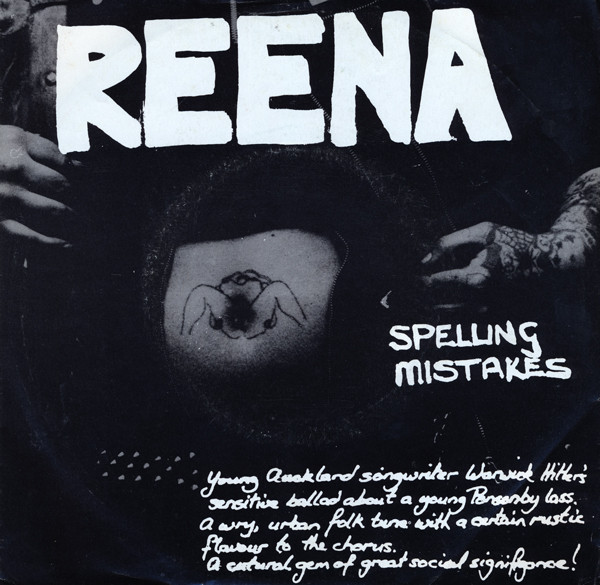
Spelling Mistakes' 'Reena', issued as one side of a double A-side with Whizz Kids. It was not for the lyrically fainthearted. Recorded before their debut, it was issued after it by Ripper.
The Spelling Mistakes and Whizz Kids paired up for a single (‘Reena’ b/w ‘Occupational Hazard’) on Ripper Records in August, while the Marching Girls’ ‘First In Line’ b/w ‘True Love’ on Propeller Records hit No.39 on release on 22 August and stayed in the charts for five weeks.
The Respectables finally recorded four tracks at Harlequin that month and announced plans to tour the South Island, which never happened. They would see out the month at XS Café with The Screaming Meemees.
A new soon-to-be important venue appeared in Victoria Street West in August when Charlie Gray opened the Rumba Bar.
There were two international shows of note in August as well. The Members were on at Auckland Town Hall on the 22nd and Magazine played three nights at Mainstreet with Pop Mechanix, on 28 and 30 August and 1 September.
September was yet another busy month for Pop Mechanix. They doubled up for three nights at Windsor Castle and Kicks from the 4th to the 6th, followed by weekends at the new Rumba Bar and The Gluepot. Then it was back to Kicks, Windsor Castle and Rumba Bar for a trio of three-night stands. Somewhere in there, they found time for a Radio Hauraki live to air and recording session with Mike Chunn at Mascot Studios that produced their first hit single, ‘Now’ b/w ‘Radio Song’.
Toy Love, who’d already decided to disband but were keeping it quiet for now, managed a final spasm of Auckland shows at Mainstreet, Windsor Castle, Esplanade, Kicks, Gluepot with The Gordons and The Androidss in support.
Having seen their album reach No.4 in the charts in August 1980 and third single ‘Bride Of Frankenstein’ make No.22, Toy Love had done their dash.
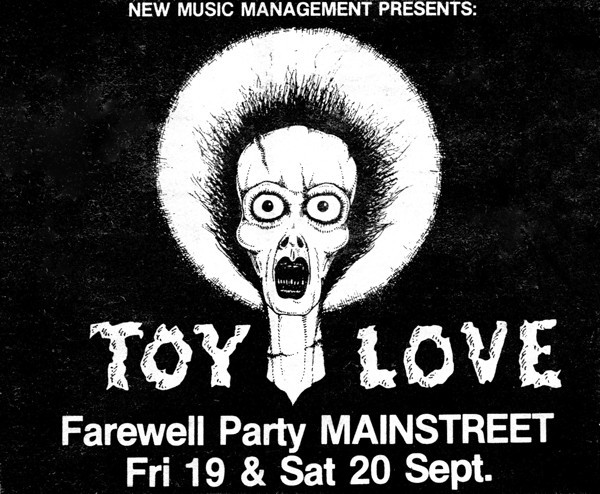
Toy Love's farewell. - Andrew Schmidt collection
The third group to dominate the Auckland post-punk live scene in September were Penknife Glides, who headlined a Gay Liberation Dance at Logan Campbell Centre on the 7th, then shifted to XS Café for three nights and The New Station Hotel for four more.
There was one hiccup in September. Mainstreet was closed late in the month due to noise complaints, despite having recently been sound-proofed. But not before hosting British new wavers XTC on the 16th, the night after they played Logan Campbell Centre.
On the recording front, The Gordons got their game-changing EP (‘Future Shock’, ‘Adults and Children’ and ‘Machine Song’) down at Harlequin, where The Newmatics, with new drummer Ben Staples replacing Dick Reed, would also capture ‘Five Miseries’ and ‘Walkie Talkies’.
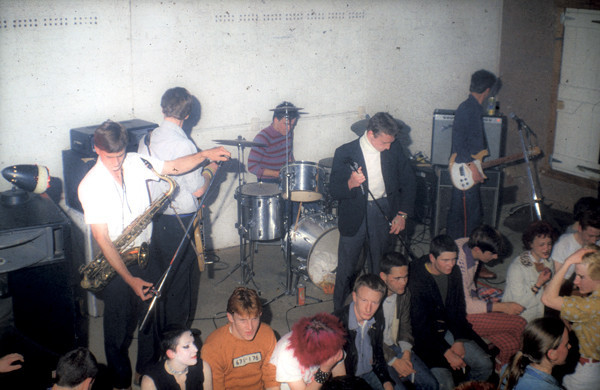
The Newmatics at XS Café - Simon Grigg collection
Rebel Truce, the mysterious North Shore group, which included Screaming Meemees roadie Terry Towelling, singer Adolf Soeteman, David O’Donahue (bass), Elf Zubielievich and The Terrorways’ Dean Martelli, spent time at Harlequin as well. With Steve Kennedy at the desk, they recorded ‘The Man Inside’, a loopy flanged near-instrumental. –
New bands in September included Rhythm Method, who racked up dates at the New Station Hotel on the 8th and 9th. The initial line-up was Gill Civil (keyboards), John Quigley (guitar), Simon Mark-Brown (drums), and Dave Harris (brass), with Matthew Flynn (sax) and Bill McGechie (vocals/ percussion).
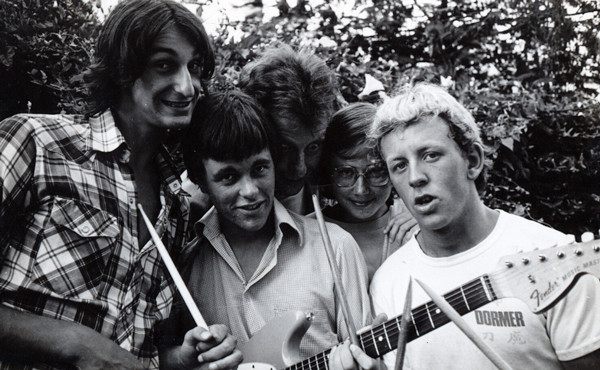
Rhythm Method, with a lineup that included future film director Simon Mark-Brown (second from left) and comedian/radio host, Willy de Witt (right). - Simon Grigg collection
The Cadets pulled together two Sloth Creatures, Wes Prince and Roddy Carlson, with Spelling Mistakes bassist Nigel Russell (as vocalist/synth) for a new group, which evolved into Danse Macabre by year’s end.
Techtones – yet another Auckland group with punk roots and a 1960s bent – released the catchy ‘That Girl’ out on Propeller Records in late September or early October.
Now
Pop Mechanix fans were soon able to drop two pieces of black vinyl by the group onto their turntables. The punchy ‘Now’ on Ripper Records slipped into the charts in early October.
“Now got played quite a lot on Radio Hauraki and 1ZM,” Andrew McLennan recalled in January 2006. “They would trial songs at night. I had a friend who worked at Radio Hauraki as a programmer, who was a big fan and he would give me updates and explain to me how the whole system worked.
“They would play it in the 7 to 9pm slot to test it out. You really knew you were home and hosed when it was played in the morning. It was really exciting getting played during the day.”
‘Now’ was quickly followed by the highly danceable ‘The Ritz’, backed with one of the best B-sides of the time, ‘Brains Are Dumb’, in early December. The second hit song was recorded by Mike Chunn at Stebbing and released through RCA Records.
Also recording in October were The Bombers (Mark Webster, Denieke Jansen, Ben Curnow and Brian Moore), who rose out of The Committee. They got ‘Dance’ down with John Garde and Doug Rogers at Harlequin Studios.
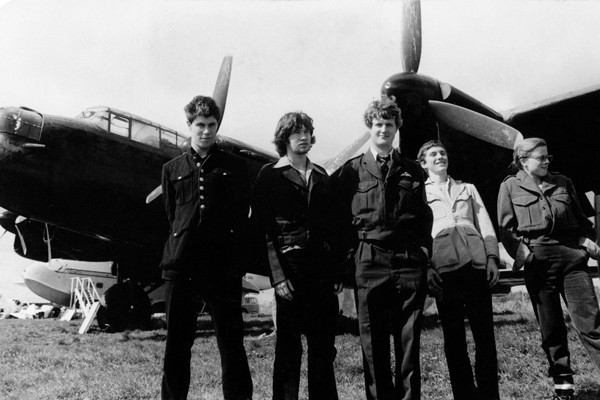
The Bombers at MOTAT. - Simon Grigg collection
Youth For A Price’s quirky one-off ‘Yeah Yeah Ooee Baby’ was captured at Harlequin by Simon Alexander. The little-seen group had Jacqui Brooks (sax, percussion), Grant Dillon (piano, organ, accordion), Alison McLean (bass), Peter Reid (drums) and Frank Stark (guitar) in the line-up. Stark had been in pioneer punks Junk before getting all weird and post-punk with a posse of punk scenesters featuring a future international film director of note.
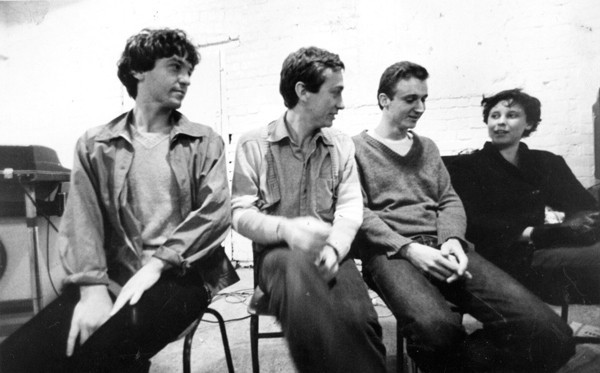
Youth For A Price included future Film Archive boss, Frank Stark (second from left). - Simon Grigg collection
The Killjoys irreverent, ‘I’m Normal’, another Steve Kennedy/Harlequin capture, introduced Phillip Campbell (vocals), Robert Andrell (bass), Malcolm Smith (rhythm guitar), Rowan Shedden (lead guitar), John Crawford (drums) and John Duckett (guitar), who came together as a group a year earlier.
October’s live list had The Gordons with Wellington’s The Steroids and Shoes This High at Rumba Bar, Rebel Truce in Vulcan Lane, Dunedin’s Terls and a belated Terrorways’ Farewell Show at XS Café with The Newmatics, and multiple Penknife Glides shows across the inner city on it. –
Auckland’s new crop continued to visit Harlequin Studios in November. Adam Holt (bass), Rowan Shedden (guitar), Phil Jackson (drums) and Hilary Hunt (vocals) of the North Shore’s The Ainsworths captured their thrashy sixties-ish action-theme ‘Danger Man’ with Steve Kennedy.
Rhythm Method, who placed second in Mainstreet’s Battle of The Bands at month’s end, recorded the spooky fairground swirl of ‘Carousel’ there, this time with Simon Alexander.
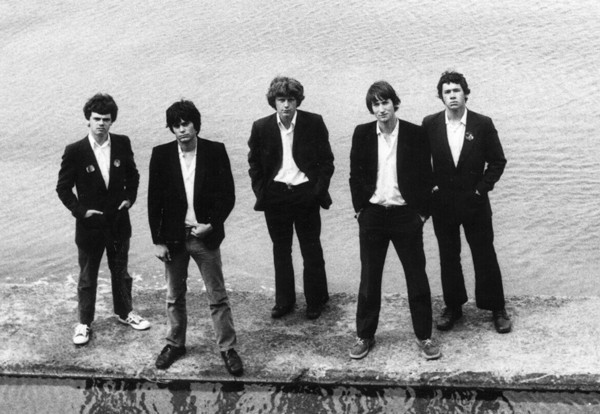
The Moderns - Simon Grigg collection
The Moderns had been together six months when they got ‘Day Is Ended’ on tape with help from Simon Alexander at Harlequin. The group’s line-up was Peter Wilberfoss (bass), Kim Gailer (keyboards), Larry Zoete (drums), Geoff Crohurst (vocals) and Grant Hannis (guitar).
Vivid Militia had 17-year-old David Wood (later of Working with Walt and Straitjacket Fits) on bass when they recorded guitarist/vocalist Derek Zilch’s ‘Let’s Go (To Australia)’ at Harlequin. Drummer Greg Murdoch filled out the recently formed trio.
All four groups with the odd and sods captured by other new bands over previous months would appear on the era-defining Class of ’81 compilation released by Propeller Records in March 1981.
Bands active on Auckland’s live stages in November included The Gordons, The Secret Agents, The Screaming Meemees, Rank and File, Rhythm Method, Penknife Glides, The Newmatics, Shoes This High and Blam Blam Blam, who’d risen from the ashes of Whizz Kids.
In the last week of November, Blam Blam Blam backed the Inside Information troupe of John Schmidt, Richard Lello, Richard Von Sturmer and Charlotte Wrightson, performing ‘There Is No Depression In New Zealand’ at Rumba Bar and XS Café.
December’s most important show was The North Shore Spectacular at XS Café, from 11 to 13 December, which brought together on one stage The Screaming Meemees, The Ainsworths, The Regulators, The Killjoys and Rebel Truce.
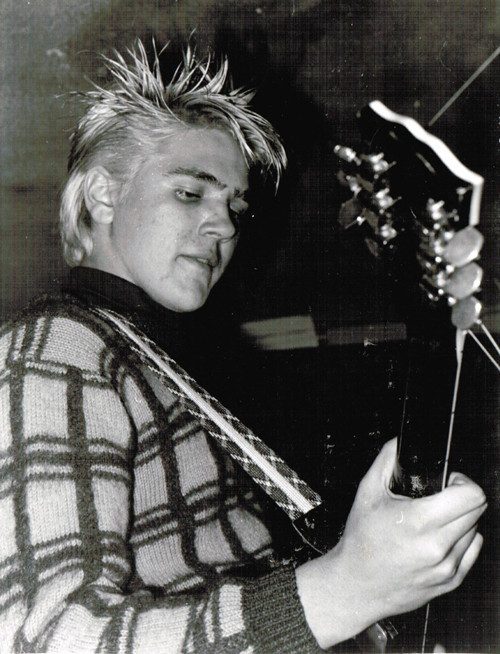
The Screaming Meemees' Michael O'Neill - Photo by Luke Nola
“A typical night at XS [would be] three bands on the bill; The Screaming Meemees, The Ainsworths and The Killjoys, “Michael O’Neill told Trevor Reekie in 2006, describing a group photograph taken outside XS Café. “Above [the] wall [outside] was the infamous car park where KC’s (King Cobras) and AK Skins were often found debating public affairs. There was always something going on in and outside of XS.”
Merry Christmas. The triumphant statement of place and identity was repeated at the Reverb Room on 26 and 27 December. This time, The Screaming Meemees and The Killjoys shared the bill with The Regulators.
The Rumba Bar was firing six nights a week (bar public holidays) in December and into 1981, as did The Reverb Room. The Windsor Castle, Mainstreet – where Danse Macabre played an early show with Pop Mechanix – Reverb Room, XS Café and Auckland Town Hall, all put on nights of note in the year’s final month. That’s where you’d find Penknife Glides, Techtones, Pop Mechanix, Shoes This High, The Newmatics and Rhythm Method.
Herco Pilots, who recorded their Wonderbook Of Things To Do EP, with Lee Connelly at Harlequin Studios in December 1980, and Shoes This High, who got the equally challenging The Nose One EP on tape with Gerard Carr at Mascot Studios, soon joined the exciting list of coming releases.
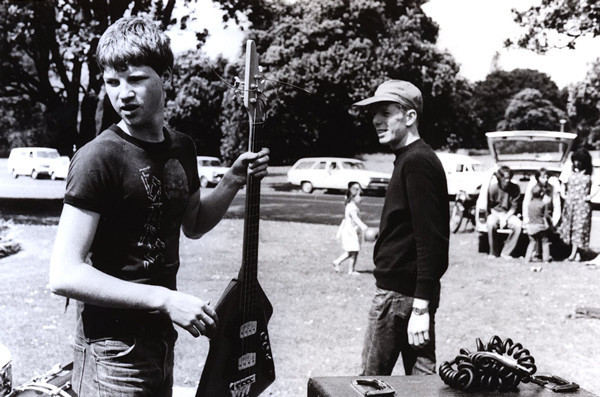
Herco Pilots' Harry "Ratbag' Russell and The Features' Karel van Bergen, Auckland Domain. The Hercos were playing an impromptu gig in the park. - Photo by Murray Cammick
Penknife Glides had been in Mascot Studios as well. Of the eight songs they recorded, the group was considering ‘Taking The Weight Off’ and ‘Laugh Or Cry’ for release on Mascot’s Warrior Records.
Despite still holding down part-time jobs and some initial resistance from bar-bookers like Charley Gray at Rumba Bar, Penknife Glides carved out a considerable niche in the city’s live scene, playing only original material.
December 1980’s Rip It Up Xtra captured a typical late 1980 night for them at XS Café. “Looking extremely sharp, Penknife Glides are out-dressed only by a handful of young mods standing by the stage. By now, the pubs are well and truly closed, and trickles of the skinhead fraternity are appearing in the corners. The band play on and the booted ones join in the dance.”
Jed Town, late of The Features, was back from Australia and working with Mike Brookfield on Fetus, a show of music by Brendan Perry (Ronnie Recent) and Town and prints exhibited at University of Auckland’s Little Theatre from the 15th to the 20th.
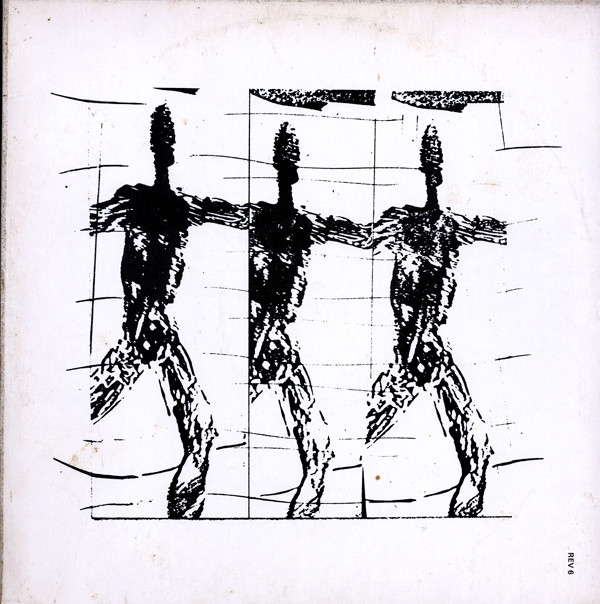
The second release by The Features, a limited numbered edition 12", Perfect Features Exposed. - Design by Jed Town
The Features’ Perfect Features Exposed EP had poked its paranoid prescient head into the national singles chart in early December 1980, four months after the quartet’s demise.
Key track ‘Victim’ was one of the most musically radical hits in the chart’s history and the words were just as compelling.
“Oh my god, something ain’t right.
You feel like the victim,
In the frame of your mind.
Been under surveillance for a long, long time.
Got pushed down so many times,
I will survive.”
Jed Town, the songwriter, was a fan of 1960s cult TV series The Prisoner, and sensed the same foreboding air in New Zealand in the late 1970s and early 1980s. “Every time you went out to play music the cops were lurking, watching,” he recalled. “The number of gigs that closed down before we even got on stage was ridiculous. Skinheads would turn up and smash bottles on the road, and the drug thing. The police were trying to find out who the drug dealers were.”
Bottles flew across the room at The Features shows at the notorious Liberty Stage and it would be the hostility and extreme threat of a Features show at Parnell’s Knox Hall on 3 May 1980 that prompted Danse Macabre’s Auckland shattered ska classic, ‘ECG.’
It was that sort of year. The real-time threat of violence remained overt in the early 1980s and often welled up suddenly. But fear is close kin to excitement and both emotions were available in abundance.
--
Post Punk Auckland 1980 - first in line - the first six months